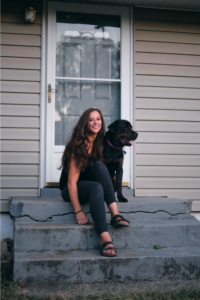Written by Jane Miller, Ph.D.
 Ever since I can remember, I have always been curious about what other people were thinking, but it was not until a couple months ago that I realized that curiosity set me up perfectly to become a psychologist. My academic journey began my senior spring semester at Union College when my undergraduate psychology advisor looked at me and said “hey have you ever considered grad school?”. I went on to join Dr. Paul Windschitl’s Judgment, Decision, and Social Comparison lab in the Department Psychological and Brain Sciences at the University of Iowa. During my time as a member of that lab, I became an expert in how people make, interpret, and communicate judgments under uncertainty and risk. Most of my research examine the various factors that contribute to the accuracy (and bias) in the different types of judgments we make about ourselves and our future. For example, how does the different comparative information you surround yourself with predict the level of healthy behaviors you engage in? That’s one of the many questions I examined during my time at Iowa.
Ever since I can remember, I have always been curious about what other people were thinking, but it was not until a couple months ago that I realized that curiosity set me up perfectly to become a psychologist. My academic journey began my senior spring semester at Union College when my undergraduate psychology advisor looked at me and said “hey have you ever considered grad school?”. I went on to join Dr. Paul Windschitl’s Judgment, Decision, and Social Comparison lab in the Department Psychological and Brain Sciences at the University of Iowa. During my time as a member of that lab, I became an expert in how people make, interpret, and communicate judgments under uncertainty and risk. Most of my research examine the various factors that contribute to the accuracy (and bias) in the different types of judgments we make about ourselves and our future. For example, how does the different comparative information you surround yourself with predict the level of healthy behaviors you engage in? That’s one of the many questions I examined during my time at Iowa.
My dissertation work, titled “The Optimism Gap: Lay Prescriptions for Characterizing, Estimating, and Communicating about Uncertainty” was composed of three papers that examined how the scientific and colloquial definitions of uncertainty differ, and how that has large implications for how scientists communicate to the public. I showed how different ways of asking people their recommended levels of optimism can have a dramatic influence on whether people seem to support having optimistically-biased expectations for uncertain events. For example, in one paper about how people conceptualize uncertainty about COVID-19, I found that people desire for other people, including government officials to be pessimistic and overprepare for the worst—even if that means closing schools. In the third paper of my dissertation, I examined the influence of social forecasts in the domain of climate uncertainty, namely uncertainty about severe storms.
Although I enjoyed doing COVID-19 and other health-related uncertainty experiments, over the past couple of years I have been adapting my research to align with my personal beliefs that scientists of all types should collaborating across scientific areas to understand more about the realities of climate change and the ever-increasing influence of the environment on day-to-day life. When looking for a postdoctoral position, I specifically sought a program that would allow me to contribute my scientific expertise to this goal.
The ability to further my research into the climate domain is why I chose to work for the Climate Change Research Network here at Vanderbilt. As a member of both the Climate Change Research Network and the Energy, Environment, and Land Use Group at Vanderbilt Law, I am around some of the top researchers and lawyers all doing work on how people adapt to climate change. Thanks to the resources provided by Sally Shallenberger Brown EELU Program Fund, I am able to work under Professor Michael Vandenbergh, Dr. Mark Cohen, and Dr. Jonathan Gilligan on several lines of social and behavioral climate-related research. Being able to work jointly with Owen and Vanderbilt Law has allowed me to hit the ground running with getting new lines of research off the ground here at Vanderbilt.
I am pleasantly surprised by how much I am enjoying Nashville—I especially love how dog-friendly it is here. When I’m not working, I’m almost always hanging out with my dog Marty. I also enjoy taking both film and digital photographs (mostly of Marty) as well as going for hikes and exploring Tennessee (also with Marty!)